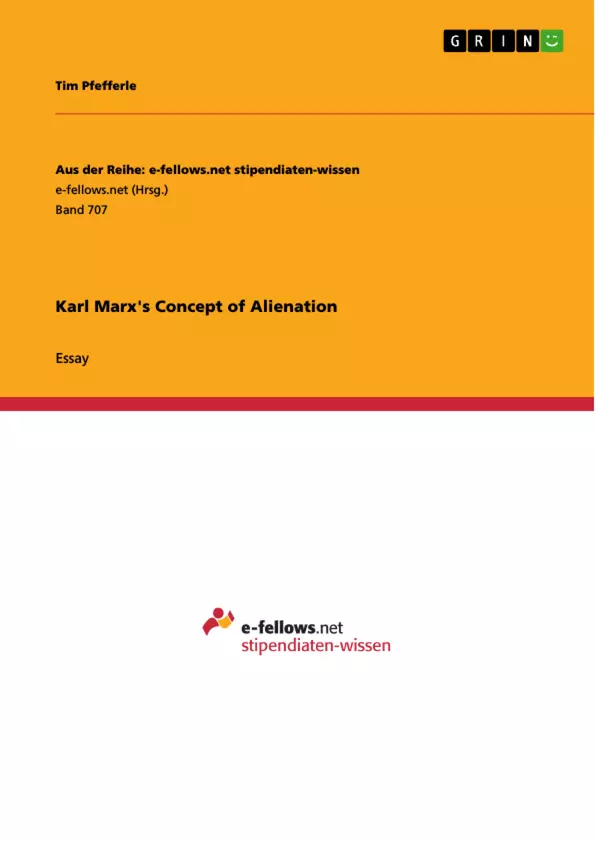Alienated labor is one of the central concepts in the young Marx’s philosophy, providing an analysis of what is perceived to be an essential feature of the capitalist way of production and how it relates to us as human beings. Moreover, it enables us to see Marx’s normative approach, how labor should be characterized in a non-alienated sense. In this essay, I will discuss the features and causes of alienated labor, its effects, the concept’s validity and the degree to which its consequences produce negative outcomes. There will also be a discussion of Marx’s notion of non-alienated labor and whether this idea makes sense.
Karl Marx’s Concept of Alienation
Introduction
Alienated labor is one of the central concepts in the young Marx’s philosophy, providing an analysis of what is perceived to be an essential feature of the capitalist way of production and how it relates to us as human beings. Moreover, it enables us to see Marx’s normative approach, how labor should be characterized in a non-alienated sense. In this essay, I will discuss the features and causes of alienated labor, its effects, the concept’s validity and the degree to which its consequences produce negative outcomes. There will also be a discussion of Marx’s notion of non-alienated labor and whether this idea makes sense.
Alienated Labor
Alienated labor is characterized by the fact that a subject engages in the production of an object that is itself independent in relation to the producer and her labor, “confronting it as something alien (original italics)” (Marx, 1844 Economic, 1978: 71). Subsequently, Marx refers to the objectification of labor (Ibid). Therefore, alienated labor is labor that manifests itself outside of the producer, is removed from it, and thus creates the division between subject and object. As a result, under capitalism the worker relates to her labor as a strange object, lacking any sort of identification with it, indeed as something alien to her.
There are four fundamental ways in which the alienation of labor manifests itself under capitalism. First, alienation is established due to the alien nature of the product itself. Marx highlights that “the worker is related to the product of his labour as to an alien object (original italics)” (Ibid: 72). In a sense, the worker loses something of himself in the process of producing this alienated object, as she does not relate to it as a meaningful part of her own existence as a human being, but merely as an independent entity unconnected to herself. Therefore, Marx states that the “worker puts his life into the object; but now his life no longer belongs to him but to the object” (Ibid).
Secondly, the process of labor itself is subject to alienation as well. Since the worker is engaging in a sort of productive activity that she herself cannot be said to have chosen freely, the act of production is forced labor. That is to say, even if the particular employment is indeed of the well remunerated type, the worker would still not choose to do it if not for capitalism’s requirements in terms of acquiring money in order to make a living. Thus, capitalism coerces the worker to engage in alienated labor. Marx argues that the sort of work implied by capitalism is by definition “external to the worker” (Ibid: 74). It is labor that does not recognize and affirm the human being to the point where she “denies [herself]” (Ibid). Therefore, just as the product of the worker’s labor appears as an alien, independent entity, Marx sees the productive activity itself in the same vein, given that the “product is after all but the summary of the activity of production” (Ibid: 73). Thus, the two characteristics of alienated labor discussed above are two sides of the same coin.
Frequently asked questions
What is the main topic of the text "Karl Marx’s Concept of Alienation"?
The text discusses Karl Marx's concept of alienated labor, focusing on its features, causes, effects, and validity. It also explores Marx's normative view of non-alienated labor.
How does Marx define alienated labor?
Marx defines alienated labor as a situation where a worker produces an object that is independent of them and confronts them as something alien. The worker's labor is objectified and detached, creating a division between the subject (worker) and the object (product).
What are the four ways alienation manifests itself under capitalism, according to Marx?
Marx identifies four key aspects of alienation under capitalism:
- Alienation from the product of labor: The worker relates to their product as an alien object, losing a sense of connection and ownership.
- Alienation from the process of labor: The act of production is forced labor, not freely chosen, and external to the worker's self-expression.
- Alienation from species being: The worker is alienated from their human potential and capacity for free, conscious activity, which Marx sees as defining human beings.
How does the alien nature of the product contribute to alienation?
The worker invests their life into the object, but it becomes separate from them, belonging not to the worker but to the capitalist system. This detachment creates a sense of loss and estrangement.
Why is the process of labor itself considered alienating?
The worker does not choose the labor freely. The worker is coerced by capitalism to engage in this specific labor. Therefore, the work is external and does not affirm the worker.
What does Marx mean by "species being" and how is it related to alienation?
Marx views "species being" as the defining characteristic of human beings, particularly their capacity for free, conscious activity and the implicit consideration of fellow species members. Alienated labor denies the adequate expression of this species being, leading to alienation from one's own humanity.
- Arbeit zitieren
- Tim Pfefferle (Autor:in), 2013, Karl Marx's Concept of Alienation, München, GRIN Verlag, https://www.grin.com/document/213748



